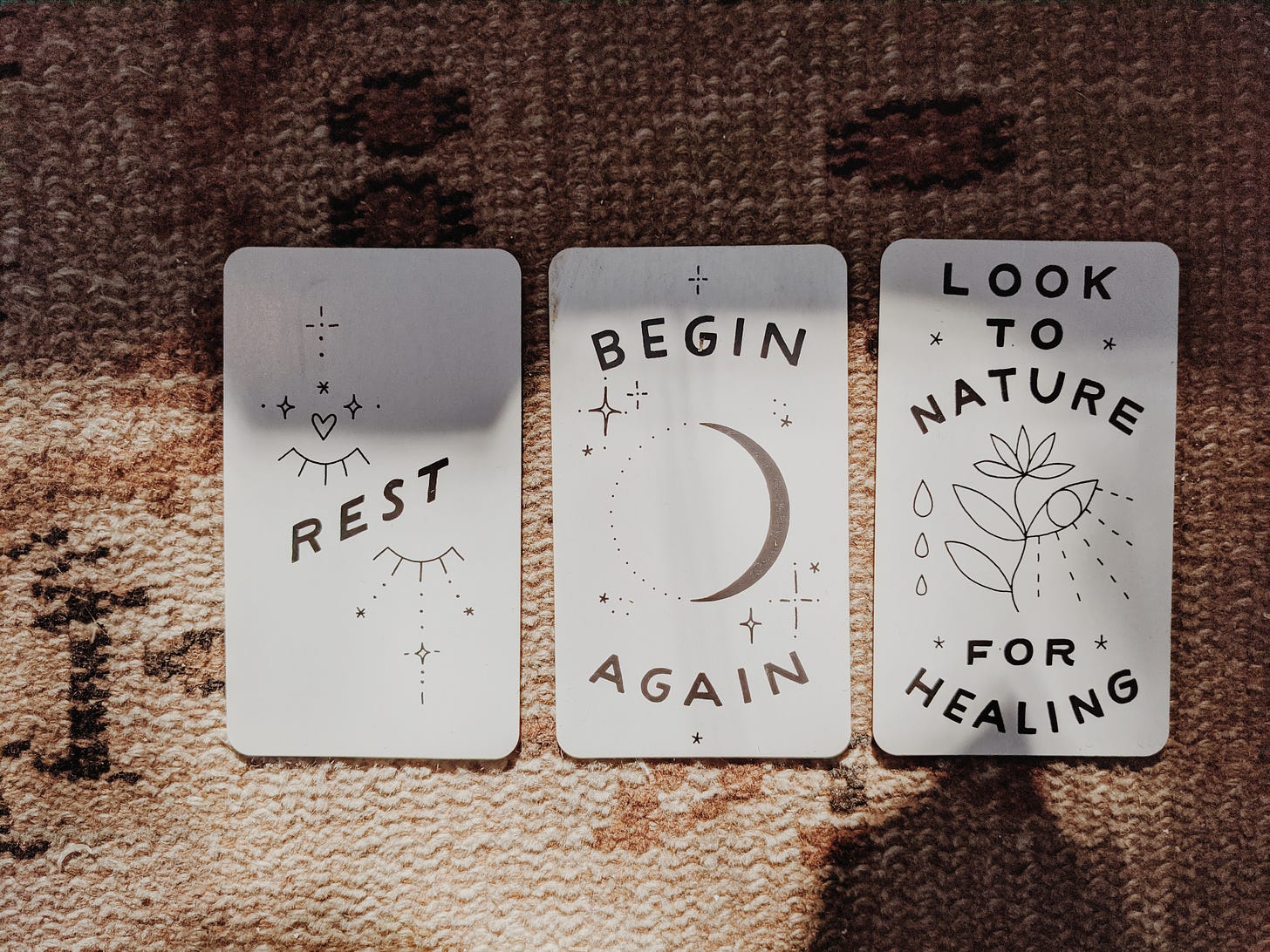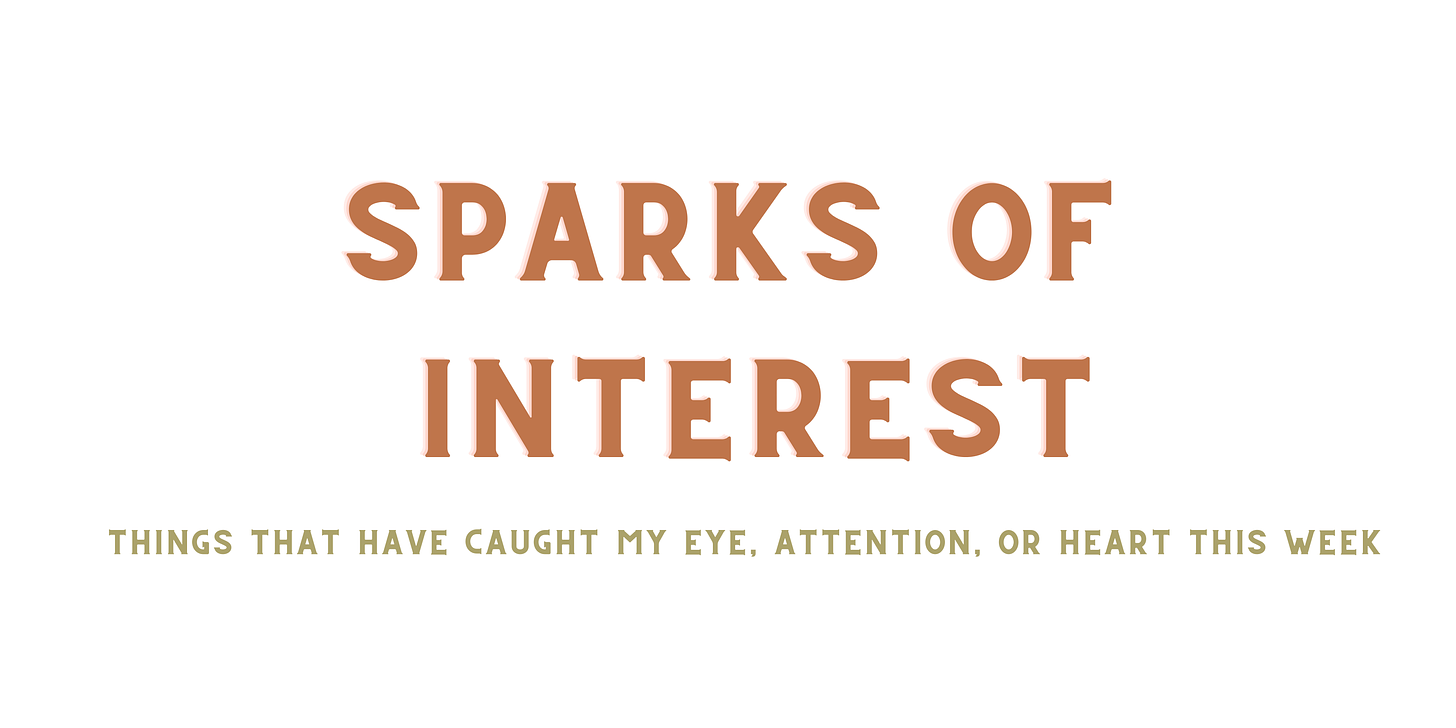Human Stuff is a free weekly newsletter. If you’d like to create reciprocity for my work and also access my monthly audio recording, q&a, & journaling guide, I invite you to become a paid subscriber. Your support means so much.
Please feel free to share parts of this newsletter that connect with you on social media or send to someone you love. You sharing my work helps my words reach more people!
A song I’ve been loving:
Hope /hōp/ noun: a feeling of expectation and desire for a certain thing to happen.
Hope /hōp/ verb: wanting something to happen or be the case.
“Hope is a discipline.” — Mariame Kaba
How do you hold hope when things feel hard, scary, like too much, overwhelming, uncertain? How do you cultivate hope when it might be harder to find? How do you nurture hope when it feels present? How do you remember hope returns again, even when it feels far away?
These are questions I’ve been exploring lately and, from what I have heard from many of you, hope is something on your mind & heart, too. I find hope to become more central when it feels hard to grasp, somehow — like it becomes more of a focus when we know we need it most. And right now seems to be a time many of us are needing it most, our collective is needing it most, our souls are needing it most.
So, as I look to re-center hope in my own life during a time of personal upheaval and collective shared grief, I want to offer some of the practices I’m turning to in order to remember and practice hope. I share these for myself as much as for you — as practices we can cultivate for ourselves, together.
〇 Making hope a practice
Instead of holding hope as something I’m always supposed to naturally feel, or something I’m expecting myself to always be able to have as a North Star, I instead hold hope as a practice — as something I’m in relationship with — as something that may wax and wane like the moon — as something I’m not failing at if it doesn’t always feel like it’s filling me. I let the practice of hope be imperfect, be based on the context in which I am needing it and the capacity I have to really feel it, be permeable and shapeable to whatever I may be moving through, and to not be required 100% of the time in order for it to be real & valid. Hope as a practice feels a lot more doable than hope as a permanent state. Hope as a practice feels a lot more supportive than hope as something to feel guilty for not holding 24/7. Hope as a practice feels a lot more human than having an expectation to identify as a “hopeful person” — and letting hope be something I’m regularly practicing has so much less pressure than pushing myself to take it on as an identity.
〇 Rooting into possibility when hope feels hard to find
The truth is that I don’t always feel hopeful. Sometimes, I feel dread or wonder how things will possibly change, get better, become more easeful for all. Other times, I feel deep anger taking root in me. Lots of the time, I don’t even know what to feel because there’s just so much swirling within that makes it challenging to pinpoint. When hope feels out of reach for whatever reason, I instead root into possibility. What else could be possible? How else could things go? What else could take shape? Possibility doesn’t require belief or certainty. It doesn’t even require fake positivity or performed hopefulness. It just requires a willingness to be curious about what else could be, even if we aren’t quite sure how to fully feel or embody it yet. Possibility becomes a lighthouse that usually points me back to hope in moments I am really needing it.
〇 Finding one small thing
It can feel overwhelming to try and hold hope for the thousands of things seeming to go wrong every day in our world — to hold hope against acts of hate, against bigotry, against supremacist systems, against all the hurt so many are holding in countless ways. When it feels like too much, I move away from trying to hold hope for everything and toward holding it for one small thing. Can I hold hope for my mood to shift eventually? Yes. Can I hold hope for this dinner to turn out to be delicious? Yes. Can I hold hope for my capacity to take another breath? Yes Can I hold hope for making it through another day? Yes. These micro ways of finding hope remind me of my power, of my agency, and of my ability to then slowly expand it outward when I am able to out of overflow and compassion, and that always feels so much more true.
〇 Turning to personal history
When feeling lost or distant from hope, I turn to my own history. I think back to 16 year old me in a psychiatric hospital with no idea of how she was going to go on. I think back to her complete lack of belief in anything else but her pain being possible. I think about her not being able to envision herself in a year, let alone decades. I think back to all I’ve overcome, all I’ve moved past that I wasn’t sure I would, every hard thing I’ve lived through and made it to the other side of, and all the hard things I continue moving through with as much humanity and grace as possible. And I feel hope again. I remember I’m an embodied version of hope as a person. I remember all of us are in our own ways. Turning to personal history to recall just how much hope must have been there all along, even when I didn’t feel it moment to moment, reminds me hope is still within my bones, even when I can’t always access it. It’s in all of us.
〇 Nurturing presence
Hope often requires turning outward and expanding our vision, looking to the future, planning, dreaming, envisioning what could be, and seeing beyond the here and now. While this is accessible and possible much of the time, it also might not be some of the time. When I feel discouraged in trying to look at the long game or see the big picture, I return to the present. I return to nurturing the glass of water in front of me and the game of peekaboo I’m playing with my baby. I return to making sure I eat enough and connecting with a friend when I feel lonely. I return to noticing the flower that bloomed after receiving not nearly enough rain. I return to what’s right here, and I let that be enough for now, and eventually it propels me back to being able to hold more than just this. Nurturing presence is a way of nurturing hope, of letting it return naturally, of noticing our own aliveness and letting that be a living example of hope.
〇 Letting others hold it for a while
It’s easy to forget I’m not the only one trying to hold hope — that I’m not doing it alone — that it doesn’t all fall on me to be hopeful constantly. Hope is woven by millions, cultivated by each of us, and sewn into life collectively. I remember being in choir as a child, singing together to create a chorus, joining single voices to create a full song. When we needed to pause for a breath, we could — because everyone else kept singing and it wasn’t even noticeable when we needed to bow out for a moment. I think the same might be true for hope. When my vision becomes blurred by grief or my heart becomes hardened by everything on the line, I no longer force myself to carry it all. I trust others will take the load when I need to set it down. I believe others will ignite their hope even brighter when I can’t find mine. I know others will usher hope into the conversation when I don’t have it in me. None of us need to be responsible for being the sole providers of hope to the world. When we remember we’re all moving through life together, we can give ourselves permission to let others sing their hope when we need to take a breath.
All this to say… if you have a hard time holding hope 24/7, it’s okay.
If hope doesn’t always come naturally to you, it’s okay.
If it feels silly or naive to hold hope, it’s okay.
If you have moments or days where hope feels far away, it’s okay.
If you aren’t sure how to find hope again, it’s okay.
If hope isn’t so easy to believe in when the world is hurting, it’s okay.
If you can’t remember how to reach for hope sometimes, it’s okay.
and,
When you do feel hope, send it out to others who might not.
When you do feel hope, let it fully be there.
When you do feel hope, see what you can do with it — how you can put it into action.
When you do feel hope, notice where it lives in your body.
When you do feel hope, trust it. Allow it. Savor it. Use it.
When you do feel hope, know you are deserving of it.
When you do feel hope, don’t cling to it — it will return again.
We can practice hope instead of cling to it. We can trust in our capacity to feel it instead of forcing ourselves to fake it. We can allow hope to guide us toward the next right move. We can let others hold it when it feels to heavy to hold personally. We can let hope be a path to travel on instead of a destination to reach. We can let ourselves off the hook of trying to take on hopefulness as an identity, and instead remember it’s okay if it comes and goes. We can look to the people and places who are embodying it when we forget it. We can let hope drip from head to toe when it arrives. We can hold it with an open palm and practice, practice, practice. We can remember and forget. Over and over. forever. Each of us. Separately and together.
△ Hope is an embrace of the unknown
△ Ada Limón’s new book of poetry, The Hurting Kind
△ Anchor in hope with your body
△ This incredible essay on living into uncertainty
△ A sweet recording of Sarah Blondin and her son
△ A reminder about letting ourselves live:

△ A favorite book on hope
△ Salads for lunch every day (in my favorite East Fork Pottery)
△ Singing to my daughter — specifically Shania Twain, Fleetwood Mac, & Celine Dion
△ This playlist while working & writing
“Hope is not a lottery ticket you can sit on the sofa and clutch, feeling lucky. It is an axe you break down doors with in an emergency. Hope should shove you out the door, because it will take everything you have to steer the future away from endless war, from the annihilation of the earth's treasures and the grinding down of the poor and marginal... To hope is to give yourself to the future - and that commitment to the future is what makes the present inhabitable.”
— Rebecca Solnit, Hope in the Dark
With care,
Lisa
And, if you feel like sharing below… where are you finding hope these days? How are you holding it, letting it go, allowing it and trusting it to return? I would love to hear from you. Thank you deeply for being here.









Hope feels so complex.
I can hold hope for other people and external things. But holding hope for myself is much more difficult.
I feel hope in some ways and through some things, usually in nature and in movement; but, bouncing off of last week, it feels so much safer to not hold on to hope at all than to feel it and have to let it go.
Thank you for the idea of breaking it down into smaller steps, that is very helpful.
Thank you so much for this - it moved me to tears. I haven't figured out why, but I've always been a 'hopeful person' - against all odds - and it's kept me here on this side of living for this long. I love your framing hope as a practice!